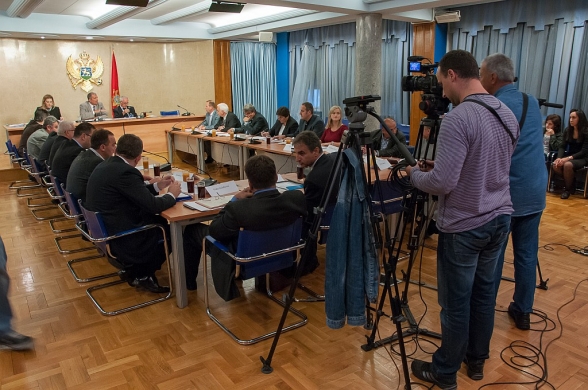The Initiative to hold a control hearing was submitted by the MPs Janko Vučinić, Radovan Asanović and Novica Stanić.
Mr Miodrag Radunović, MD, Minister of Health, said that the epidemic occurrence of gastroenterocolitis in the municipality of Berane was being monitored by the Hygiene Epidemiological Service of the Medical Centre, which conducted terrain and epidemiological research and that only after the collection, analysis and processing of all the relevant data could there be a more detailed information on this epidemic, or conclusions on possible causes and the manner of transmission of the causer. He pointed out that some important information is missing so that the cause of outbreak of epidemic and the manner of transmission could not be determined with absolute certainty. In order to confirm the cause of epidemic, what need to be determined are the cause of infection and the very causer-microbiological agent, which should be found both in the source of infection and the samples of materials for microbiological diagnosis taken from the sick patients. Based on the information gathered so far, as well as the path of the epidemic process, characterised by the sudden outbreak and a large number of infected in a short time period, it was concluded, as the Minister Radunović pointed out, that this was an epidemic with a common source, which coupled with the fact that the increase in the number of infected occurred immediately after the pipeline breakdown, with the consequential distribution of hygienically irregular drinking water, follows that this was a case of a hydric epidemic. The current daily number of registered patients has come down to the same number of registered patients before the epidemic, therefore the epidemic of gastroenterocolitis in the municipality of Berane is considered over. The increased epidemiological supervision over the bowel infectious diseases shall be continued until the expiry of maximum incubation period for causers that have a very long incubation period, and which can potentially cause infections if they are present in the water. The Minister Radunović pointed out that, as always, the health care workers had passed the test, and that they had provided aid for everyone.
Mr Vuka Golubović, Mayor of Municipality of Berane, said that there were no omissions in their work, and that the damages to the plumbing pipes occurred due to mining of the local road. He said that the contractor had to use explosive devices due to terrain configuration, and so the strength of detonations and vibrations led to bursting of pipes.
Mr Boban Mugoša, MD, director of the Institute for Public Health, said that turbidity of water was registered in March this year when the construction of the local road begun. He pointed out that the water was currently regular, but it needed to be boiled because turbidity might appear again.
All members of the Committee participated in the debate, asking questions and commenting. Additionally, everyone who was invited to come to the meeting of the Committee contributed to the discussion, in order to obtain information as complete as possible.
What the members of the Committee wanted to know was when the water in Berane would be safe to drink, to which they received no reply.
There is a danger that, due to the faulty water installations and a great amount of waste in the city itself, there could be new epidemics.
What is acceptable for everyone is that plumbing pipes, not only in Berane, but in all municipalities of the north region, are worn out, and that they should be replaced, and that in accordance with the EU standards asbestos pipes need to be withdrawn from use, for which there needs to be an application with the IPA funds.
Following the four hours of the control hearing, the Chairperson of the Committee on Health, Labour and Social Welfare Mr Zoran Jelić concluded the 20th meeting of the Committee and suggested that, in accordance with the Article 77 paragraph 2, the Committee should submit to the Parliament a Report on the control hearing as well as the appropriate conclusions.









